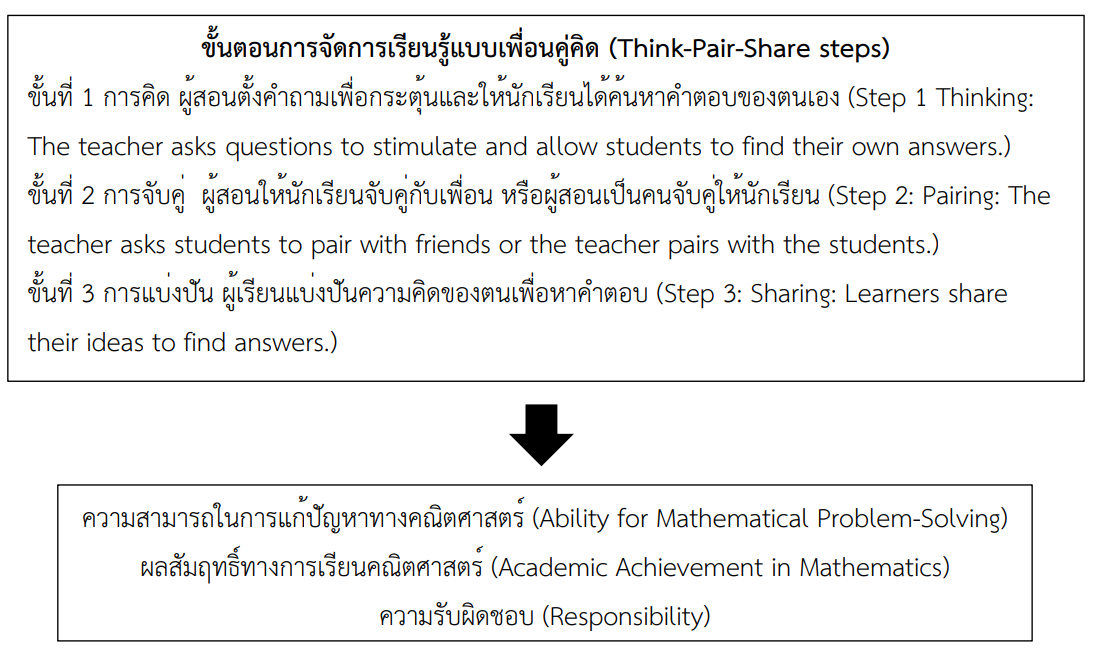Ability for Mathematical Problems-Solving by Think-Pair-Share Technique of Grade, 4 Students
DOI:
https://doi.org/10.14456/jcct.2024.11Keywords:
Think-Pair-Share Technique, Ability for Mathematical Problem-Solving, Academic Achievement, ResponsibilityAbstract
This research aims to study the ability for mathematical problem-solving by Think-Pair-Share technique of grade, 4 students at Municipal School, 5 in Siharakwittaya, Udon Thani Province in this study. The instruments used for data collection were learning management plans, academic achievement tests, ability for mathematical problem-solving tests, and responsibility tests leading to data analysis using mean, standard deviation, and t-test. The results found that the ability for mathematical problem-solving and academic achievement of students was higher than the 70% criteria with statistical significance at the .05 level. The ability for mathematical problem-solving after learning management was high-level accounting for 55.19%, moderate-level accounting for 41.31%, and low-level accounting for 3.44%, respectively. The responsibility after learning management is at the highest level.
Downloads
References
Bureau of Academic Affairs and Educational Standards. (2008). Indicators and Core Learning Content for the Mathematics Learning Area followed Basic Education Core Curriculum B.E. 2551 (A.D. 2008). http://academic.obec.go.th/images/document/1559638928_d_1.pdf. (In Thai)
Dechakoop, P., & Yindeesook, P. (2015). Learning Management in 21st Century (2nd ed.). The Chulalongkorn University Press. (In Thai)
Hanmontri, T., & Tongmoon, M. (2022). A Development of Learning Activities Using Collaborative Learning with Think-Pair-Share Technique to Promote Mathematical Problem-Solving Ability on Interest and Value of Money of Matthayomsuksa 5 Students. Journal of Roi Et Rajabhat University, 16(1), 35–45. (In Thai)
Junkiaw, T. (2021). The Learning Management Using Creative Problem Solving Process Together with Think-Pair-Share Technique on Mathematical Creative Problem Solving Ability of Seventh Grade Students. [Doctoral dissertation, Srinakharinwirot University]. DSpace at Srinakharinwirot University. http://ir-ithesis.swu.ac.th/dspace/bitstream/123456789/1885/1/gs611130004.pdf. (In Thai).
Kaewsunthorn, J., & Yawai, A. (2022). Development of Learning Achievement on Solving the Problem of Adding Subtracting, Multiplying, and Dividing Counting Numbers of Grade 4 Students by Using Cooperative Learning Management Think-Pair-Share Technique. The 55th National Graduate Research Conference, 27–36. https://grad.nrru.ac.th/ngrc/static/media/OED01-จิรนันท์%20เกี้ยวสุนทร.f49fa7ed9e61527267fd.pdf. (In Thai)
Khemmani, T. (2016). Teaching Science: Knowledge for Effective Learning Process (20th ed.). Chulalongkorn University Press. (In Thai)
Paicher, P., & Keeratichamroen, W. (2021). A Study of Learning Achievement, Problem Solving Ability and Scientific Mind of Grade 8 Students Using Problem-Based Learning with a Think-Pair-Share Technique. NRRU Community Research Journal, 15(2), 239-251. https://doi.org/10.14456/NRRU-RDI.2021.39. (In Thai)
Promrak, M., & Makanong, A. (2014). Effect of Organizing Mathematics Learning Activities Using the Problem Solving Model of Matacognitive Process on Mathematics Problem Solving and Critical Thinking Abilities of Eighth Grade Students. An Online Journal of Education, 9(1), 56–70. (In Thai)
Rungsoi, W. (2023). Learning Behavior Modification on Displine and Responsibility of Fifth Grade Students (Grade 5/5), Academic Year 2021. Santapol College Academic Journal, 9(1), 1–8. (In Thai)
Seema, W., Poprom, U., & Klangprapan, M. (2013). The Effect of Team-Assisted Individualization in Cooperative Learning in Conjunction with Polya Process Entitled “Mixed Addition, Subtraction, Multiplication, Division” Affecting Learning Achievement, Abilities to Solve Mathematical Problems and Learning Satisfaction of Prathom Suksa 4 Students under the Office of Nong Sanom Educational Network Center. Journal of Graduate School Sakon Nakhon Rajabhat University, 10(46), 235–246. (In Thai)
Sribua, P., Chaowatthanakun, K., Thipworawimon, S., & Sukprasert, S. (2023). Study of Mathematical Understanding on Multiplication and Division of Polynomial for Mathayomsuksa 2 Students Using Game Based Learning with Think Pair Share Technique. RMUTSB Academic Journal (Humanities and Social Sciences), 8(1), 112–124. (In Thai)
Toeyhom, A., Juithong, S., & Pichayakul, T. (2020). The Effect of Cooperative Leaning using Think-Pair-Share Techniques for Reasoning Mathematics on Multiplication Division of Grade 4 Students. ARU Research Journal Humanities and Social Sciences, 7(3), 1–8. (In Thai)
Vaiyapoka, P., Angganapattarakajorn, V., & Suwannapho, P. (2022). The Effect of Learning Activity Organizing Using Open Approach with Think Pair Share on Mathematics Learning Achievement and Mathematical Problem Solving Ability of Mathayomsuksa 4 Student. Journal of Educational Research, Faculty of Education Srinakharinwirot University, 17(2), 105–117. (In Thai)
Wongkaew, S., & Lee, A. (2019). The Results of Inquiry Based Learning Intervention Cooperative Learning Think-Pair-Share Technical and Supplementary Drills on Integrated Science Process Skills and Attitudes Related in Science for the Lower Secondary School Students’ Class 2/1 at A Large Secondary School in Bangkok. Suan Sunandha Academic Journal of Education, 3(2), 66–74. (In Thai)
Yooteagool, O., La-ongthong, S., & Wannupatam, B. (2021). Effects of Learning Management on Mixed Problem Solving by Using Team Assisted Individualization Technique with Polya’s Problem Solving Process on Promoting Learning Achievement and Problem Solving Thinking Ability of Prathomsuksa 3 Students. Journal of Humanities & Social Sciences (JHUSOC), 19(1), 97–116. (In Thai)

Downloads
Published
How to Cite
Issue
Section
Categories
License
Copyright (c) 2024 Journal of Computer and Creative Technology

This work is licensed under a Creative Commons Attribution-NonCommercial-NoDerivatives 4.0 International License.






























